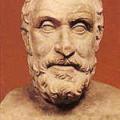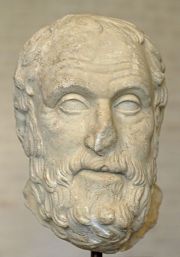70 - The Know Nothing Party: the Skeptical Academy
Under Arcesilaus and Carneades, Plato’s Academy took a skeptical turn, casting doubt on the possibility of knowledge. But was their skepticism skeptical enough?
Themes:
• J. Allen, “Academic Probabilism and Stoic Epistemology,” Classical Quarterly 44 (1994), 85-113.
• R. Bett, “Carneades’ Pithanon: A reappraisal of its Role and Status,” Oxford Studies in Ancient Philosophy 7 (1989), 59–94.
• C. Brittain, Philo of Larissa: the Last of the Academic Sceptics (Oxford: 2001).
• M. Schofield, M. Burnyeat and J. Barnes (eds.), Doubt and Dogmatism: Studies in Hellenistic Epistemology (Oxford: 1980).
• H. Thorsrud, “Arcesilaus and Carneades,” in R. Bett (ed.), The Cambridge Companion to Ancient Scepticism (Cambridge: 2010), 58-80.
Stanford Encyclopedia: Arcesilaus and Carneades







Comments
Off Plotinus
Thanks a lot for this great website!
My question is, will we be able to listen some lecture on Plotinus (and Neoplatonism in general), or is it there somewehere and I just could not find?
It would be a great present!
Best.
In reply to Off Plotinus by Ammonius
Plotinus
Hi - Plotinus is coming along later along with many episodes on Neoplatonism. I will get to him in episode 88. If you can't wait that long you can hear me discussing Plotinus on another podcast, here.
In reply to Plotinus by Peter Adamson
Thanks a lot Professor
Thanks a lot Professor Adamson,
Since I am writing my MA Thesis on Plotinus, yes I am looking forward for this episode. Many thanks for the link which I'll listen instantly.
This is a truly excellent
This is a truly excellent series; I have been listening with great pleasure and enjoyment. Peter Adamson explains things beautifully and discusses philosophy in an intriguing and original fashion; I’m particularly impressed by the episodes on Plato and Socrates. I look forward to hearing more.
Skeptics and Socrates
Really have been enjoying the HoP. I now have a reason to go work out and run or clean around the house. It gives me chance to listen to the podcast! This one is especially interesting because I learned the part about "dogma" and intellectual commitments. Was it the critics who used this terminology? Or was it Antiochus? In a way moderate skepticism seems skeptical of skepticism. Does this mean they are more thoroughgoing skeptics than the moderate skeptics? Antiochus seems really interesting. Can't wait for the next podcast! Question: "The only thing Socrates knows is that he knows nothing." With the cave myth in mind, Socrates who has the knowledge that he knows nothing seems coherent with a philosopher who has had a beatific vision or left the cave to the world of the forms. He then has to go back down into the cave and deal with a lot of people who think they know stuff. But in fact the first step would be to realize and help others realize it's not real knowledge at all. So are skeptics thinking about this at all? (Was Socrates?) Do any philosophers talk about whether human thought is from the world of the forms, or whether it has supernatural (a level above nature) properties, etc?
In reply to Skeptics and Socrates by Robert
Dogma
Hi Robert,
Very interesting post, thanks. These are difficult questions (but I fixed that typo for you, which was easier). I'll give it a shot but others may want to weigh in also:
1. I don't know for sure (maybe nobody does) who first used "dogma" in this philosophical context but I think it was more the skeptics using it to describe the positive views of the other schools. Some groups were called "dogmatic" for instance the rationalist school of medical thinkers, who were also called "dogmatics" (we'll get to them in a few episodes).
2. I think you're right at least about Socrates, indeed he makes it explicit in the Apology that his mission, as it were, is to show people that their confident claims to knowledge are ungrounded and I think it's clear that this sort of process is at stake in the Cav allegory. Bear in mind that when the philosopher descends into the Cave, he risks being put to death when he tries to shake the prisoners out of their illusiory world -- seems a clear allusion to Socrates' own fate. It's a more difficult question as applied to the Skeptics. On the one hand they are clearly signing up for the part about disabusing people of their ungrounded claims to knowledge. On the other hand of course they hold out no prospect of an improved, securely grounded kind of knowledge since as far as they know this is not possible. The Neoplatonists have a lot to say about your final question, so hang on for a bit for that!
Peter
In reply to Dogma by Peter Adamson
further note on dogma
By the way I should have mentioned that unless I'm misremembering, the Jonathan Barnes piece in Burnyeat and M. Frede (eds), The Original Sceptics, has an interesting discussion of the historical roots and range of meaning of the Greek term "dogma".
In reply to Dogma by Peter Adamson
The Cave
Hello Peter,
Thanks for your podcast! I think that the Cave tells us that the final destination (at least for the philosopher) is not Socratic aporia but knowledge. If so, does Plato somewhere attribute this view to Socrates? Also how do the Platonic Sceptiks account for the Cave - I mean would they say for example that the Cave does not represent Plato's view on knowledge, or that it does represent his view but that he was wrong?
Thanks!
Charles
In reply to The Cave by Charles B
Socrates, Plato, and knowledge
Hi Charles,
Good questions. There is a lively debate in secondary literature on whether the Socrates of the early dialogues would claim to have some sort of knowledge after all. He often seems to, e.g. in the Gorgias he puts forth ethical theories with what looks like great confidence (like "it is better to be wronged than to do wrong"). Even there you do get caveats though along the lines of "I say this without claiming to know" so the question is whether he takes himself to have, for instance, justified true belief but not knowledge, or maybe knowledge of a sort but not of the best sort. That latter idea is supported by a passage in the Apology where Socrates distinguishes between divine and merely human knowledge, so we could perhaps say he has the latter but not the former.
I agree that the Cave, and indeed many other passages in Plato, would make it hard for the ancient skeptics to claim they are "Platonists". They would perhaps say that Plato is right about what knowledge would amount to, but that Plato's demanding account shows that we cannot attain knowledge (this may be how they dealt with the Stoics too, albeit that they might not admit to accepting the Stoic criteria for knowledge). Mostly though I think they emphasize the earlier aporetic dialogues.
Thanks!
Peter
In reply to Socrates, Plato, and knowledge by Peter Adamson
Plato's dialogues and the Academic Skeptics
Hi Peter, I think it is perhaps misleading to say the Academic skeptics emphasized what we have somewhat posthumously coined "the earlier aporetic dialogues," implying then that they too worked with an organization of Plato's corpus in a way similar to our own devices for organizing them (I don't mean to suggest such an organization did not exist at the time in the Academy, but only to say it may have been otherwise, topical rather than temporal). Another reason to be suspicious of this, I think, is Arcesilaus' turn away from any explicit, let's say, refutative interest in ethical debate. It seems the so-called new Academic movement put aside notions such as courage, piety, justice, etc. in order to make sense of knowledge (and its relation to truth and wisdom) first and foremost. Plato's Theaetetus might have been more of an influence on these skeptics than the early dialogues, and perhaps, what they relied on to sidestep more seemingly dogmatic claims about knowledge in the Republic.
Thank you for the podcasts,
Charles
In reply to Plato's dialogues and the Academic Skeptics by Charles Snyder
Socrates and the skeptics
Hi Charles,
Right, I certainly didn't mean to suggest that the Academic Skeptics had the idea of distinguishing periods in Plato's career or aporetic/non-aporetic dialogues. The first attempts to organize the Platonic corpus, as far as we know, come in the early Imperial period and, as you say, are topical and not in terms of time period (or in terms of Plato's philosophical commitments, since as far as we can tell all ancient Platonists assumed that Plato's views did not change over time; the same for Aristotle and his adherents, as we'll be seeing).
Your point about the Theaetetus is a very good one. Of course a lot of people (nowadays) would count it among the aporetic Socratic dialogues anyway. But, although we're mostly guessing, I would agree that the Theaetetus must have been a source of inspiration for the skeptical Academy. Perhaps this helps to explain the existence of a very early commentary on Plato, the first one we have, which is on the Theaetetus.
Thanks!
Peter
Add new comment